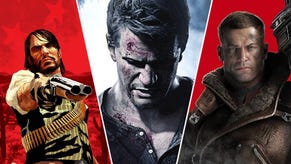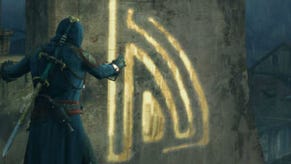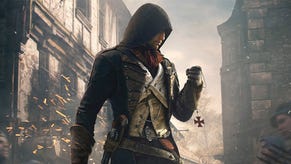Assassin's Creed Unity Xbox One Review: The Blood of Angry Men, the Dark of Ages Past
USgamer's lengthy thoughts on Ubisoft's next Assassin's Creed. Does Unity live up to the pedigree of Black Flag?
This article first appeared on USgamer, a partner publication of VG247. Some content, such as this article, has been migrated to VG247 for posterity after USgamer's closure - but it has not been edited or further vetted by the VG247 team.
Jeremy Parish, Editor-in-Chief
So here I am, chasing some idiot through the streets of Versailles. He's a thick-witted, half-literate ruffian, quite unlike my sharp-eyed protagonist Arno Dorian, and yet somehow he seems a lot better than me at the simple act of running.
Sure, Arno may be faster, but when he runs he has a maddening habit of suddenly leaping onto nearby scenery, often getting hung up on a bit of scaffolding or some kind of elaborate masonry. I just want him to catch the thug who stole his memento, to run along the same path as his quarry, but regardless of my intentions Arno takes the slightest deviation from the target's route as a prompt to make a flying leap for the nearest ledge, or cart, or building, or whatever.
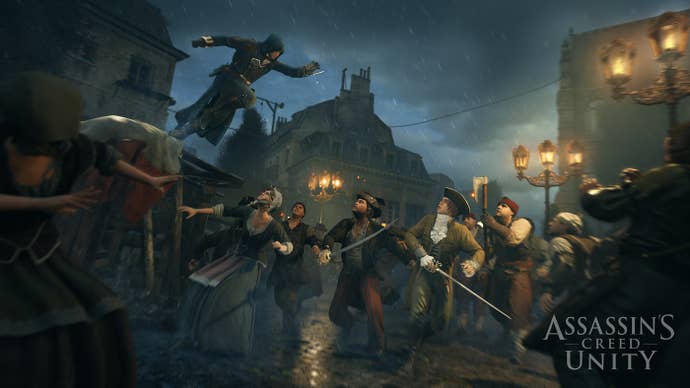
This only needs to happen once or twice before the game "desynchs" and forces me to start over. The first mission of the game, and already I'm annoyed and frustrated. Yep - Unity is an Assassin's Creed sequel, alright.
I get why Ubisoft starts so many entries in this series with a chase sequence. Free-running makes these games what they are, and a high-speed pursuit allows the game designers to introduce the concept without players needing to worry about combat or any of the more demanding game concepts right away. But at the same time, these chases invariably reveal the intrinsic flaws of the mechanics on which Ubisoft has built Assassin's Creed; free-running works in large part because the game fills in the blanks for you. You point your protagonist in the right direction and make a break for it, and the artificial intelligence figures out an optimal route for you, so you can scramble up and over most elements of the scenery without having to break your stride. Or at least that's the idea, anyway.
Unity's free-running AI works in general, but it often misses the mark. Sometimes it fails in broad strokes, like when you simply want to chase a man down the street but the game decides that because you tried to cut a corner to close the gap between yourself and your target what this means that you really wanted to do was stick to a wall and let the man you're chasing get even further away while you try to fuss with the contextual controls. Meanwhile, the camera pans wildly around, making it impossible to tell precisely which contextual controls will work for the current situation. Sometimes it fails in the particulars, like the way Arno can't pivot cleanly on his heel or make precise fine movements, so a simple act like grabbing onto a ladder can be an exercise in frustration. Sometimes the AI just doesn't work at all, such as when Arno's pathfinding glitches out and he just kind of stands there while enemies bear down on him, or when you try to hide in cover and Arno decides to do something else entirely and your perfect stealth assassination run fails through no fault of your own.
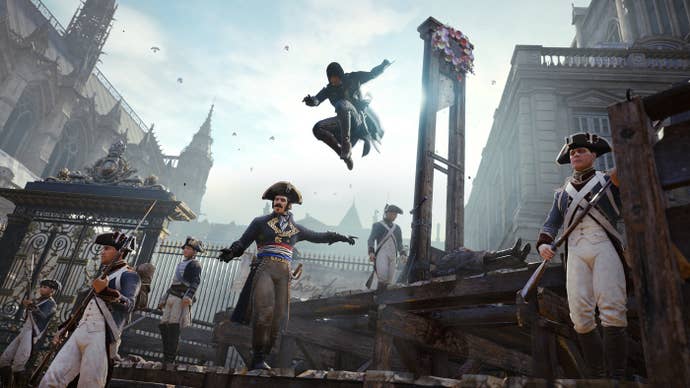
Of course, none of this is new to Unity. It's just a part of Assassin's Creed. To Unity's credit, you can see the developers made a genuine effort to refine the control scheme, though with mixed results. Compared to previous protagonists, Arno's controls offer more player input: The buttons' "puppet" metaphor remains in place (because of course the series' increasingly tiresome virtual simulation meta-narrative remains in place as well), but this time you can use different buttons to alter the vertical orientation of Arno's parkour while holding the right trigger. You can also use the left trigger to make Arno move quickly and soundlessly, which is great for closing the distance to unsuspecting enemies to shank them before they have time to spot you.
In practice, though, the up/down orientation doesn't work quite as well as it should. Free-running "down" is likely to get you killed with its unpredictability. Free-running "up" usually prevents Arno from leaping from too high a point and falling to his death... but every once in a while, he'll take an inexplicable dive onto nothing and die anyway.
And this is invariably how Ubisoft chooses to introduce the game to you: By showcasing its buggy, awkward, inconsistent control scheme through a simplistic, uninspired mission design. Thankfully, it gets better... mostly.
Kill Thrill
20 hours later, I'm chasing someone else. This time, it's meant to be a bit more exciting; I'm chasing a hot air balloon across the rooftops of Paris while artillery (courtesy of Napoleon Bonaparte's regiment) explodes around me. In practice, though, it's the same garbage that I had to deal with at the beginning of the game.
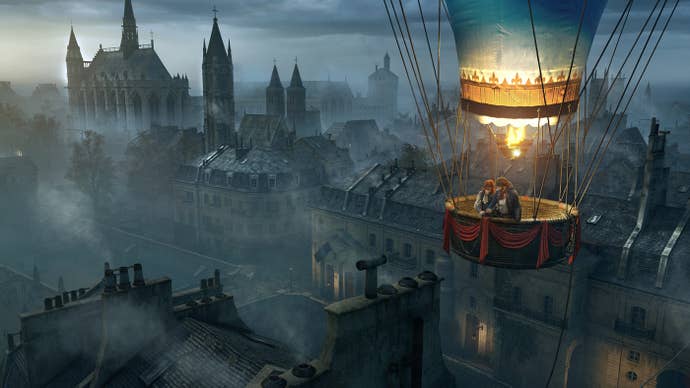
There are numerous gaps that I need to cross via tiny cables spanning the buildings, but because of the uneven topography of the roofs I can't usually see the cables until I'm on top of them - or worse, far to the side of them. And even once I've memorized the route by my third attempt at the chase, Arno's just as likely to decide to stick to the gables of the roofs as he is to make the flying leap toward the cables that I've tried to nudge him into doing. Of course, there is one difference between this chase and the one back at the outset of the adventure: This time, the balloon passenger keeps spouting the same three snarky audio samples at me, because of course goading players as they grapple with awkward game design is the secret to winning hearts.
Moments like these make me hate Assassin's Creed. More than that, they make me detest the entire philosophy of modern game design that leads developers to try and give players "cinematic" experiences without the underlying substance and mechanics to back it up. Movies are exciting because you can witness someone else's impossible feats; games are exciting because your exciting feats introduce the possibility of failure. But when games try to be exciting in the same way as movies, the results usually fail as a game or as a movie. If you can't fail, there's no excitement; if you can fail, and do, the excitement fizzles when you try again and realize how canned everything is. Assassin's Creed tries to carve out a space in the middle by letting its protagonist call his own shots, but it rarely works the way it's meant to.
Thankfully, there's more to Assassin's Creed - and to Unity in particular - than these ill-considered chases and set pieces. They represent only a tiny, frustrating slice of the adventure, and here they feel almost like a vestigial appendage left over from when the series was still trying to find its way. For the most part, Unity lets you tackle things on your own terms... and there's a ridiculous amount to tackle. Every time you scramble up to a viewpoint and "synchronize" and area, your map becomes inundated with icons representing things to do.
The hundreds of events spread across Paris vary wildly in quality from "open yet another treasure chest" to "become involved in a massive, hour-long caper that you can complete at your own pace by whatever means you prefer." It's these latter episodes that make the game: The core story episodes, in which you thin the upper ranks of the opposing Templar order one assassination at a time, show Unity at its most confident... and at its most interesting.
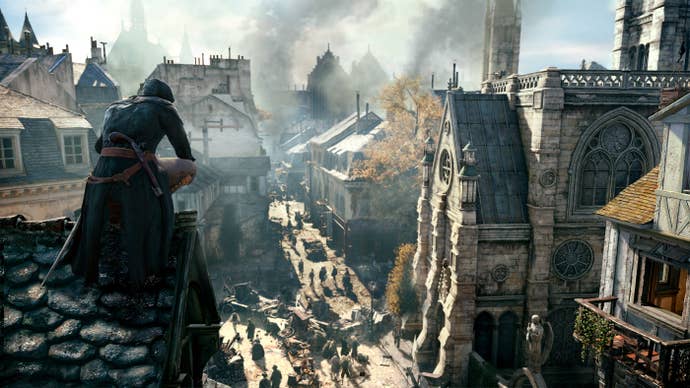
Unity restores the concept of stealth to series for the first time since the original game.
Each major assassination begins with Arno surveying the sprawl before him, highlighting a few different options to complete the task at hand. Granted, these can be a little too on the nose thanks in large part to the checkboxes that linger in the HUD to point out your available options; Assassin's Creed has never dealt in the subtlety of Hitman or Dishonored, and it has no place for player discovery opportunities. Yet even with your missions neatly bullet-pointed, how you proceed falls largely to your discretion. Do you don a disguise? Send guards into a berserker rage and slip through while their allies put them down? Slip quietly between patrol formations?
There's a definite thrill to be had from slipping unseen to quietly stab a powerful enemy right beneath the noses of his enforcers. It's just as satisfying to perform an assassination in plain sight, vanish in a smoke bomb, and slip unseen into a crowd, completing a mission without getting into a single skirmish. While Assassin's Creed definitely represents the lowest bar for entry to the stealth genre, Unity restores the concept of stealth to series for the first time since the original game.
Stealth become so essential here in large part because the combat has grown more difficult. Arno can take on a soldier or two, no problem, but once you face three or more enemies at a time, things get dicey. The combat rhythms have changed from previous games, feeling much less like the wait-and-counter ballet of the original and more like a genuine challenge. Enemies parry more effectively, and they hit harder. Even near the end of the game, a high-level soldier can take Arno down in a triple combo of attacks. Where earlier entries in the series made combat laughably trivial and allowed "stealthy" assassinations to play out as roaming sword fights of one man versus an entire army, here you're much better off to bide your time and take out your foes quietly, before they spot you.
In that sense, at least, I feel like Unity finally manages to make good on one of the founding principles of the entire series, and stealth feels far more varied - not to mention organic - than in any previous Assassin's Creed.
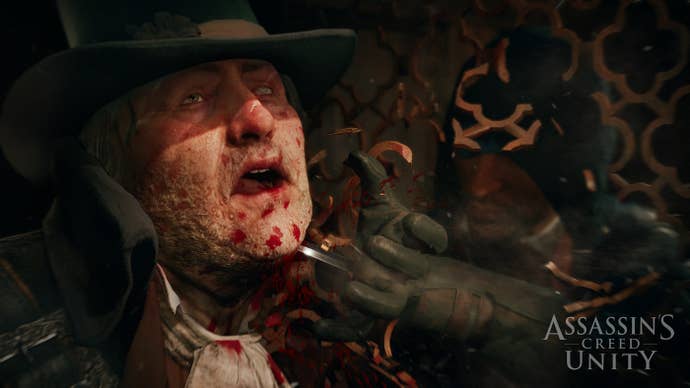
Character Assassination
By somewhat disappointing contrast, Arno himself doesn't make for a particularly compelling protagonist. To be honest, he feels like a retread of Ezio de Auditore and Edward Kenway, a cocky and hot-headed rogue with a crooked grin and a refusal to play by the rules. Evidently Assassin's Creed has two modes for its heroes: Surly and unlikeable, or rakish Han Solos. Arno's story even kicks off in earnest with a mission reminiscent of one of Ezio's formative memories: A late-night assignation with a beautiful lady followed by a flight across the rooftops.
It's a shame, because there's a much more interesting story running parallel to Arno's that would have made for a fresher take on the Assassin's Creed universe: That of his lady friend Élise. Where Arno's tale is a fairly straightforward "you killed my father, prepare to die" revenge fiction, Élise undertakes a much more nuanced and complex journey. But you only see it from the outside. While it's gratifying to have a prominent female companion who doesn't need to play the distressed damsel (because she's too busy killing everyone in sight) and is much less interested in the hero's proclamations of love than in pursuing her personal mission, Ubisoft missed an opportunity by not making her tale the central narrative over Arno's.
Of course, the people aren't the only characters that comprise Unity's cast. As ever, the setting plays every bit as significant a role in the tone and direction of the game. In this case, Unity takes place in Paris during the French revolution and incorporates key moments of French history - the storming of the Bastille, the execution of Louis XVI - and the plot intersects with significant personages of the era such as Napoleon Bonaparte and the Marquis de Sade.
This is all par for the course in the series, but it's the city itself that sets Unity apart. Paris feels at once vast and lively, with enormous crowds cramming the streets. The nature of the city changes from neighborhood to neighborhood. Protestors gather to stoke fires outside the mansions of the bourgeois, while the ragged poor simply keep their heads down and go about their business in the more impoverished areas. The jam-packed streets can take a toll on the game's performance - I saw the action chug and stutter a few times during some of the more ambitious sequences - and both the city and the crowds make liberal use of copy-and-pasting, which can result in unavoidable gaffes like half a dozen guys in the same pompously feathered top hat gawking at Arno as he scurries about his business.
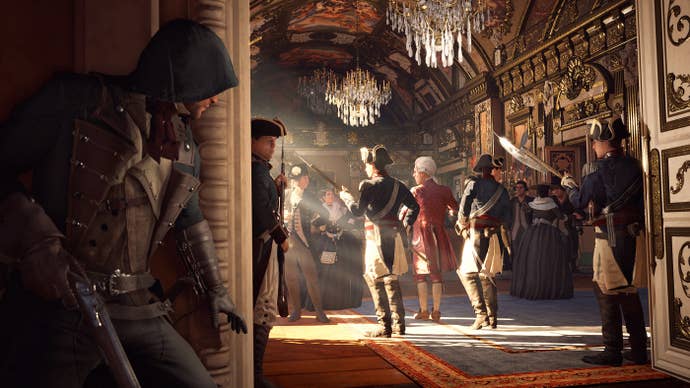
Even with these little hiccups, the overall effect impresses. Paris itself is gorgeous, and the feel of the city changes as the quality of light shifts with the time of day and the weather. Running through a wooden shantytown in a gloomy downpour feels entirely different to climbing the buttresses of Notre Dame in the glare of midday sun. Interior spaces add a great deal to the feel of the game as well; many buildings are open for traversal rather than existing as big, blank boxes, and these range from ornate mansions to humble shacks. This does more than simply add some visual variety to the adventure, though; it changes the nature of your traversal through the city. Passing through buildings rather than just over or around them may not be the most polite way to get about, but it's terribly convenient.
Likewise, the crowds have a huge impact on how Unity plays. The throngs of hundreds that fill the streets play a big part in making stealth feel more natural and organic; for the first time, it actually makes sense for the protagonist to lose his pursuers by blending in with bystanders. Wander into a crowd with soldiers in hot pursuit and you quickly lose sight of them, too.
Paris is for Killers
Unfortunately, Paris is something of an empty shell. The crowds are lively, but the bustle only serves to highlight just how little you can do to make Arno interact with his surroundings. Assassin's Creed basically amounts to historical murder tourism: You travel through the events of the past, but your only real option for taking part in these events boils down to racking up a body count. You have a wealth of options for performing those kills - poison gas? Hidden blades? Sword fighting? Death from above? Yanking a sniper over the ledge to fall to his death? - but in the end you're just free-running (sometimes quite awkwardly) through a new configuration and skin for the Assassin's Creed sandbox so you can kill people.
Again, nothing about this is any different than in the series' previous entries, but in Unity it stands out more than usual. It's because of those teeming crowds. Ubisoft Montreal has gone to great lengths to assign interesting behaviors to its faceless masses, and there are certain crowd interactions and NPC behaviors I've only seen once in the dozens of hours I've played. Gentlemen discreetly kissing a lover's neck in the shade of an awning, or a young man helping an old lady walk down the street as she clutches his arm for support. These little tableaus make Unity's Paris one of the most intriguing and vital open worlds I've ever witnessed, but they also serve as a reminder that Arno isn't part of it, and neither are you.
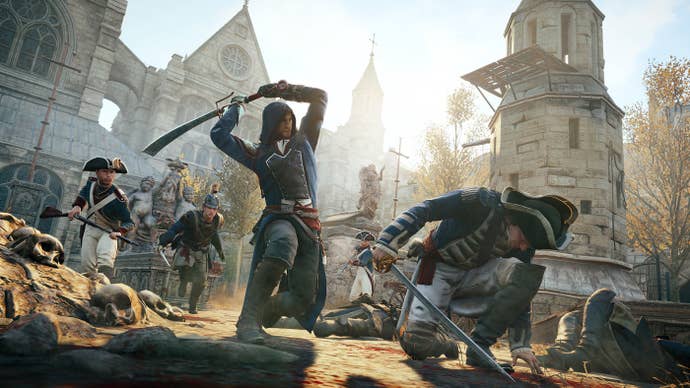
Sure, there's more to in Unity than just performing assassinations, but these tasks are incidental and feel deeply systemic and mechanical. Buy a cafe to improve your home's earnings. Find hidden collectables - this time patriotic cockade badges instead of feathers or whatever, though it's all the same in the end - to earn a perk and an Achievement. Stop street crimes in progress to win accolades and goods. These mechanisms keep ticking away at all times, even hen they shouldn't.
I'm reminded of that near the end of the main story, when Arno's tale comes full circle and he's once again chasing a thug who stole his precious memento. I take special care to avoid any inconvenient bits of scenery that might cause my protagonist to decide to waste time sticking to a wall instead of running after his quarry. And suddenly the game desynchs anyway, because I was tracking the wrong yellow mini-map circle out of the corner or my eye. As I was tasked to "catch the thug," depicted with a tiny, solid, yellow circle, a street robbery spawned at random nearby, prompting me to "catch the thief," depicted with a tiny, empty, yellow circle. I wasn't paying enough attention to the yellow circles. For the third time, I've flubbed a chase mission because... well, I'm not really sure why. But once again, it doesn't really feel like I failed because I've messed up.
[Unity] has soaring moments of greatness, but they're mired in a fundamentally uneven game design that shows no signs of changing.
I'm ultimately torn on Assassin's Creed: Unity. It has soaring moments of greatness, but they're mired in a fundamentally uneven game design that shows no signs of changing. This game is about refining the series' core rather than giving it the thorough reworking it needs; the only revolution happening here spills through the streets of Paris.
Even the much touted cooperative play - ostensibly the source of this entry's subtitle - feels incidental, contained to standalone extra missions. It basically takes the place of the previous games' competitive multiplayer, presented as individuals missions integrated into the sandbox rather than existing as a separate mode. Still, the core story missions (the best part of the game) play as a strictly solo experience, and there's no opportunity for Crackdown-style free-form multiplayer where you and your friends can run rampant through the streets of the city regardless of whether or not you're engaged in a mission.
Unity's central story and its breathtaking rendition of Paris (equally stunning across multiple eras) make for a compelling adventure to be sure. But the momentum of the fundamental Assassin's Creed design refuses to be deflected from its ponderous course, despite some genuine attempts to redefine how it all works. Little peeps of cleverness shine through from time to time, like the intoxicating teaser of the World War II setting we've all been demanding for so long, or how "Eagle Vision" works when your hero is hung over. These moments of brilliance make me like the game, but I do wish that fondness required less effort on my part.
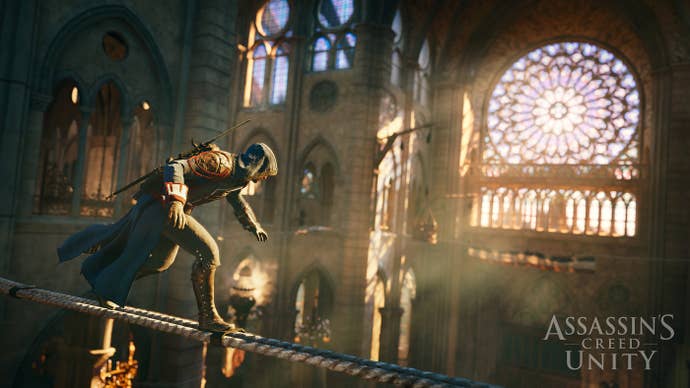
Mike Williams, Associate Editor
The refrain is exactly the same: new year, new Assassin's Creed. This year, however, things are a bit different. Assassin's Creed Unity is the first game in the series target at our current generation consoles, the Xbox One and the PlayStation 4. With the increased power of these consoles at its back, Ubisoft decided to rebuild the franchise. Assassin's Creed Unity is the new vision of the series moving forward. Is it a good soft reboot for the franchise?
Despite some issues, I'd say yes.
As part of the rebuild, Ubisoft has mostly done away with the modern day/near future framing sequence that brought together most of the other games. There's no additional character outside of our assassin protagonist, no world we inhabit outside of Arno's. Instead, we are people enjoying Abstergo Entertainment's Helix system, a commercial version of the Animus. The current Assassin Brotherhood burrows into our time-hopping entertainment box through a back door and simply asks for help. I'm glad, as the modern day stuff had become mostly a distraction from what players actually cared about. And there's some tantalizing hints of what could be next in those first opening scenes, including assassins in the North American 1920's or Ireland.
I largely agree with Jeremy's take on Arno, but I appreciated the look into the ongoing Assassin/Templar war. Unity asks if both sides really should be fighting each and if there's a common ground to be had. It feels like Ubisoft tends to forget that at their core the Templars are about Order and the Assassins are about Freedom. Both of those ideal are dangerous when taken to extremes and Unity does a decent job of highlighting those extremes. It's something I've wanted from the series and I hope Ubisoft continues to take the story in similar directions.
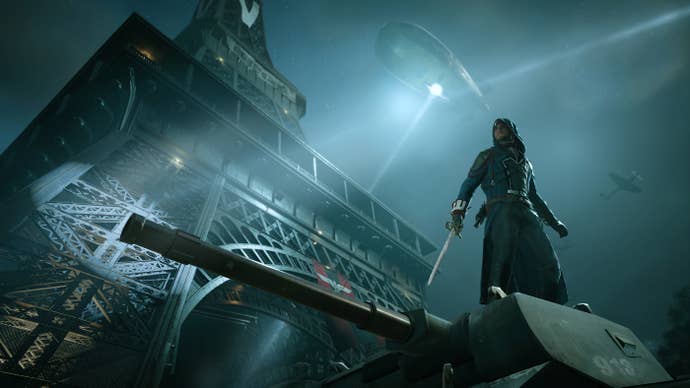
There's also a new story addition in the Helix Rifts. At certain points in the game, your assassin initiate is shuffled out of Arno's time and into other eras in Parisian history. Your first time through these missions tend to be rather exciting sprints through unfamiliar landscape, before giving way for collect-a-thons in repeat performances. I like the idea of the Helix Rifts because Assassin's Creed tends to switch era and location, even if a location has other interesting time periods. This allows you to see other versions of Paris and the game is stronger for it, even if they're only small diversions in the overall plot. If Ubisoft needs to carry anything forward story-wise, the Helix Rifts are it.
I Get Around
I'm the resident Assassin's Creed aficionado, so while Jeremy had issues with traversal in the game, I'm largely used to how the series handles at this point. (Yes, Arno would hitch on a ledge or corner occasionally, but it was improved over the preview build and I doubt the game will ever be perfectly precise.) I understand the basic movement and physics of Assassin's Creed and learning each new title is mostly about getting a feel for the character. Some assassins are on the lighter side (Ezio), while others had a meatier feel to them (Connor). Arno is in-between and there seems to be some thought given to his weight: when you start running, Arno doesn't run full tilt, he takes a moment to get up to full speed.
Learning that and grasping the new Parkour Down mechanic took only an hour or two. Once you understand Parkour Down, you'll see that it's not a revolution in the series. Instead, it's about adding some granularity to your movement options. Leap out or drop down? It's a different action for a different situation. The choice is now yours and high-speed movement is all about preserving momentum.
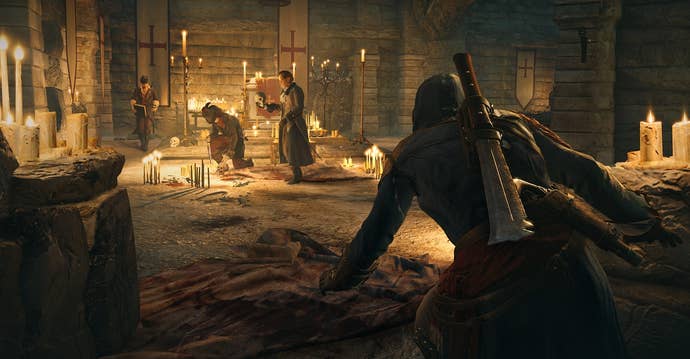
On the other side of gameplay, Assassin's Creed Unity is all about stealth. Sure, you can play a more melee-focused assassin if you so desire, but many of the game's major missions are built with stealth in mind. The basic tools Ubisoft gives you assume you'll be playing a stealthy character. Even the online Heist missions reward stealth, not sword-fighting.
As such, Ubisoft has offered some new options to improve your stealth experience. There's a low-profile mode that acts as the duck button we AC fans have long asked for. There's the cover snap and Last Known Position mechanics cribbed ruthlessly from Splinter Cell: Blacklist. There's even a heavy focus on breaking line of sight if you're seen. Smoke Bombs are still very useful, enemies no longer look at cover if you break line of sight, and the game's huge crowds are easy to hide in if you don't try to sprint away. Assassin's Creed Unity wants you to take a more measured approach to assassin-ing, though you can still run-and-gun when you're out in the city.
And wow, that city. Unity's Paris is huge and beautiful. From the rooftops and walls, it's a pleasure to look out over the city. I wasn't too big on the setting, which is why Jeremy was the lead on this one, but the presentation of the Paris won me over. Ubisoft is getting really good at recreating real cities. The biggest boon is the huge crowds; they mill about the city, converge at different hotspots, and fight amongst themselves. There's also way more buildings with interiors this time around and this may be the biggest, yet understated change in Unity. Being able to explore interiors or leap through a window quickly adds to the feeling that you're actually a highly-trained assassin inhabiting this world. And the new interiors are great at helping you break line of sight or gain entry into a new area.
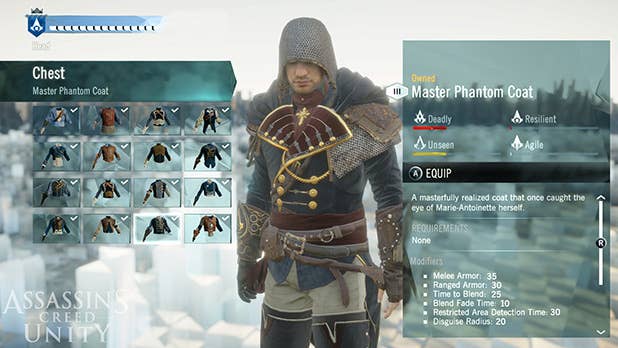
Craft Your Arno
Strike that, customization is the most important change. You can pick up skills to tailor Arno to your specific playstyle and then outfit him with colorful weapons and armor. With the game's focus on stealth, I personally found certain skill tracks essential, but I'm sure you could make the case for others. The equipment is a nice touch, but some players may have an issue with the system because half of the gear is locked behind co-op mission or Uplay rewards. That realization can sour you on Unity a bit if you don't play online; you'll want that awesome chest piece, but it's a co-op reward.
I only switched between a few different pieces of gear during my playthrough of the campaign. There are detailed bonuses for each piece of armor - adding health, improving Eagle Vision, lessening your noise, or increasing your item carrying capacity - but generally I just focused on picking up the best-looking gear that also filled up my Stealth and Health bars. I understand why the system works the way it does - online says hi - I just wish stats were separate from gear visuals.
Wait, different most-important, best-ever change: all your clothing and color options appear in every one of the game's cutscenes. As you can see in our video review, I pretty much jumped from color-to-color at random while I was playing the campaign. It's fun to enter a serious discussion of assassin politics looking like a banana. I do wish there were more color combinations, or at least the ability to choose your own colors; the color palettes Ubisoft offers feel rather limited.
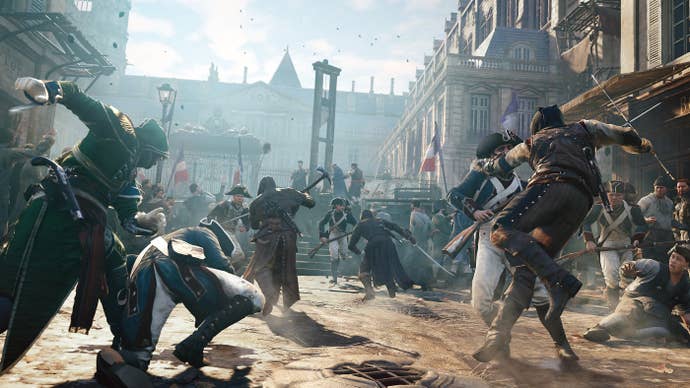
Get Thee Online
At last I come to online. There's two sides to online. The co-op multiplayer works when you're able to connect to a game, which was spotty during my review playthrough. I was able to try out a few co-op missions and when you have competent people to play with, it's fun. It doesn't rely on that competency as much as Splinter Cell's Spies vs. Mercs, but especially in Heists, one lone fool can topple the entire enterprise. I recommend playing with friends and you'll need a headset if you want to communicate at all. The Co-op Missions also feel like an integrated part of the overall story of Paris, even if they're not a part of Arno's story.
The negative side is all the damn online account connections needed to fully enjoy the game. Here's an example: around the city there's different colored treasure chests appearing on your map. White chests are simple; find them and open them. Red chests require lockpicking. Blue chests require you to use the Assassin's Creed Unity Companion app - which is rather impressive and robust for an add-on experience - to access them. Finally, yellow chests need a valid AC Initiates account to open.
Most of my playthrough, the Initiates site was simply down. Even when it was up, I needed to download the Uplay app, log into Uplay, go back into the game, try to open the chest, load up Initiates in my web browser, create an Initiates account, and then hope the whole thing would sync up in-game. It was annoying juggling accounts and apps just to open a chest. Now that it's all hooked-up, it's not as trying, but starting the whole machine up seemed needlessly complex. And that's before you even get to the microtransactions.
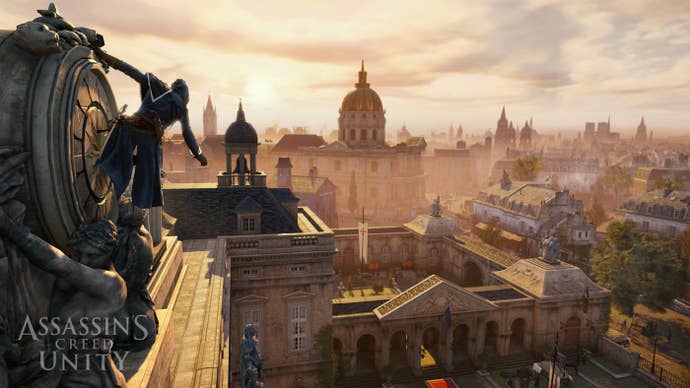
All that above is a bunch of different words just to say that Assassin's Creed Unity is hit or miss. I'd lean towards the more-positive side if I was primary reviewer, but Jeremy's score is about right. Last year's Black Flag was perfection, while Unity is a new start. That means it chugs or falters here and there (I even had three crashes on Xbox One), but the new foundation that Ubisoft has built here is still very exciting for me as an Assassin's Creed fan. Customization and co-op will keep me playing Unity longer than its predecessors, so I'll say they're welcome additions to the franchise.
Mostly, I'm looking forward to seeing Assassin's Creed 2015. Unity is damn good, but if Ubisoft can pull off another Assassin's Creed to Assassin's Creed II improvement, they'll have a winner.
Visuals: Artistically stunning, though prone to some nasty slowdown. While 18th century Paris is one of the liveliest and most gorgeous virtual spaces ever crafted, its scale takes a toll on the Xbox One hardware.
SoundAs with the control scheme, Unity tries to accomplish a lot with its audio cues, and it's not always successful. But it works more often than not.
InterfaceThe game's biggest sticking point... literally. Despite a well-intentioned attempt to refine the free-running mechanic, the predictive, AI-driven player remains maddeningly imprecise.
Lasting AppealProvided you're into the AC thing, there's probably a good 60-70 hours of unique content here: The core plot, tons of side stories, numerous sidequests, coop missions, and more.
ConclusionUnity attempts to improve on some of Assassin's Creed's innate problems, but it misses the mark as often as it hits. Nevertheless, you'll want to play it for the gorgeous rendition of revolutionary (etc.) France and the involving, opened-ended primary assassination missions. It's clear Ubisoft is trying to shake up the series a bit, but next time they need to shake a little harder.

